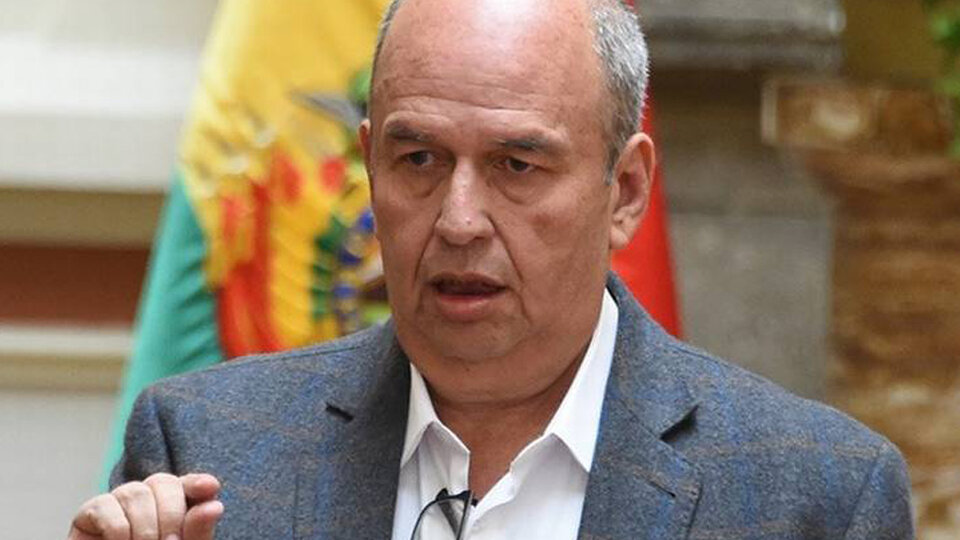
[ad_1]
From La Paz
Arturo Murillo, former de facto minister in the Bolivian government, fled to Panama. The information was given by the new police chief, Jhonny Aguilera, appointed Monday by the government of Luis Arce. With Murillo, Fernando López escaped, who was in charge of the Ministry of Defense, and is now in Brazil.
With Aguilera’s announcement, rumors from a few days ago that the two had leaked have been confirmed. Murillo and López, who had an immigration alert that should prevent them from leaving the country, left with an official Bolivian Air Force flight -FAB 046- from Santa Cruz to the town of Puerto Suárez, at the border with Brazil, from where they crossed the land to the town of Corumbá, on the other side. From there, Murillo left on November 9 on a commercial flight to Panama.
The two men in the former de facto government were those who were at the forefront of public threats and political persecution. Murillo, for example, is the one who announced the “hunt” for the political leaders of the Movement for Socialism (MAS), threatened the Argentine delegation which was in Bolivia in November last year, exhibited handcuffs to arrest Evo Morales and asserted, in the face of the August blockades of social movements, that “Putting a bullet would be politically correct.”
López, for his part, in an act which paid homage to those who had assassinated Ernesto Guevara, had threatened those who had just “subverted” the order in the country: “whatever their nationality, Cubans, Venezuelans, Argentines or other . whoever they are, they will find death in our territory ”.
Mission of the IACHR
The theft announcement came after the prosecutor’s office issued arrest warrants against them for the irregular purchase of tear gas with a surcharge. Both fled the country not to be held responsible for their actions, not only for the gas, but, in particular for Murillo, actions during events such as the massacres in Sacaba and Senkata last November.
The need for a trial is one of the central issues of the new stage in Bolivia. To advance the investigation into the massacres, the Minister of Justice, Iván Lima, affirmed that a commission of the Inter-American Court of Human Rights (IACHR) will arrive on November 23, composed of five experts and his president, Joel Hernández García.
“This government’s international inquiry will have the greatest breadth and recognition, without losing our sovereignty. We are opening the doors to the international community to investigate, assess and publish a report. The last word on the events of Sacaba and Senkata will be given by our public prosecutor and the judges of this country, ”García said.
Responsibility for the events involved both members of the former de facto government, as well as members of the armed forces and police, whose high command was changed on Monday. “We have the great challenge that the Bolivian people once again trust the armed forces, hope again that they will respect the democratic processes,” President Arce said to appoint the new posts.
In this regard, the Deputy Minister of Governmental Coordination, Freddy Bobaryn, stressed that “the institutionality of the armed forces and the police will be respected, which does not mean that we leave those who have committed crimes with impunity”.
The issue of justice is one of the main issues on the political and governmental agenda, marked by the emergencies and crises left by those who are currently fleeing the country or seeking impunity. One of the emergencies is the economy, and in particular the inherited debt, on which the Minister of Economy, Marcelo Montenegro, has said he will make an effort “so that the debt service can be temporarily suspended until ‘so that we can recover “.
Along with the changes of police and military commanders, and the beginnings of government in each ministry, the MAS organization process is taking place in preparation for the next elections of governors, mayors and councilors, which will take place in March 2021.
Evo Morales, president of MAS
Evo Morales gave a conference this Tuesday, with the national leadership of MAS, where he announced his presidency of the political instrument, as well as the realization next Saturday of a national extension to choose the candidates, with the support of social movements, and the invitation to Luis Arce, the vice-president David Choquehuanca, the president of the Senate, Andrónico Rodríguez, and the deputies, Freddy Mamani.
Bolivia is at the time of transition, leaving behind months of de facto government, opening investigations to achieve necessary justice and advancing government programs in each area, preparing for regional and local elections, political restructuring. internal in the new stage that begins the process of change
.
[ad_2]
Source link
 Naaju Breaking News, Live Updates, Latest Headlines, Viral News, Top Stories, Trending Topics, Videos
Naaju Breaking News, Live Updates, Latest Headlines, Viral News, Top Stories, Trending Topics, Videos